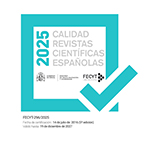(Utopia and irony in Thomas More’s context)
Abstract
The usual conception of the idea of Utopia is that of a social entity that, because of its own perfection, cannot exist in the real world. This conception is preeminent not only in modern and contemporary thinking, but also in the interpretations of More’s Utopia: according such idea, in the utopian republic, the humanist creates a perfect state, but unreal, and because of that, he places it in the island named noplace. This interpretation forgets the auto-ironical elements in Utopia, whose presence in the work avoids reading it according the scheme ideal perfection-real imperfection. We try a more “hermeneutic” reading of the english humanist’s work.Downloads
Article download
License
In order to support the global exchange of knowledge, the journal Revista de Filosofía is allowing unrestricted access to its content as from its publication in this electronic edition, and as such it is an open-access journal. The originals published in this journal are the property of the Complutense University of Madrid and any reproduction thereof in full or in part must cite the source. All content is distributed under a Creative Commons Attribution 4.0 use and distribution licence (CC BY 4.0). This circumstance must be expressly stated in these terms where necessary. You can view the summary and the complete legal text of the licence.












